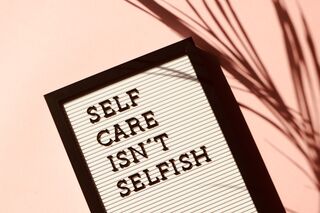Cognition
Do You Know What Self-Care Is?
It's easy to fool ourselves into thinking we know what's going to happen.
Posted January 1, 2021 Reviewed by Ekua Hagan
There’s been a lot of self-care advice out there, especially during this most unusual holiday period. As we begin a new year, it would do all of us well to try out some of the tips being offered for taking care of yourself and dealing with stress—deep breathing, meditating, exercising, eating and sleeping better, and creating your own special “me time,” to name a few.

The advice I have to add to these excellent ideas is of another sort and, because of that, it might even help you stick with those suggested wellness ideas. My advice is not so much about how you take care of what you think of as “you,” but about how you relate to yourself and everything around you.
For, if you’re like most people, you want desperately to know—what to do in a particular situation, what’s going to happen, who’s right, and who’s wrong. But if the COVID pandemic has taught us anything, it’s that we cannot know. We cannot know what to do, what’s going to happen, or who’s right and who’s wrong. The way to get through this, I’m convinced, is to embrace the unknown.
Rather than trying to convince you to join me in such an embrace, I invite you to explore with me some meanings of the unknown.
Unknown, certainly, refers to what is not known. But what kind of not known? There’s the “not known” that goes with words like undiscovered, unexplained, unexplored, unidentified, and unrecognized. This kind of unknown isn’t really not known—it’s just not known yet.
There’s another kind of unknown that refers not just to what’s unknown for now, but for tomorrow and, indeed, for all time. It’s unknown, yes, but that’s because it’s actually unknow-able. It’s this kind of unknown—the unknowable—that interests me as a psychologist. For if we look at the synonyms for unknowable, we find cabalistic, esoteric, mysterious, occult, and mystical—ways of seeing that rational beings should reject and even fear. Together, they paint a picture of some other world, not the one we “know.” Such is the cultural bias we live with—making it just about inconceivable that life on earth could be unknowable.
My professional experience leads me to see this bias as a form of self-harm. That’s because much, maybe even most, of our lives is, in fact, unknowable, and to not be able to see this (and move on to embrace it) is a setup for disappointment, paralysis, sadness, and more.
If you’re like most of us today, there’s no knowing what you’ll be doing next year or even next month. You might have plans for the next two hours. But what you actually wind up doing in the next two hours is unknowable. If you do what you planned, you’ll think that’s because it was knowable. If you don’t do what you planned, what will you think? Probably that something got in the way and the plans changed. You might go with the flow, you might be terribly upset or angry, you might be somewhere in between. Whichever way things go and whichever way you feel, it probably wouldn’t occur to you to consider that what was going to happen was not knowable until it happened.
Holding fast to the belief that the happenings of our lives are knowable can get us into deep trouble. (So too can believing that what will happen in politics and world events is knowable by the experts, the trouble of which we are witness to each day.) We can be unprepared materially and emotionally if things seem to take a sudden turn because we “thought we knew for sure” how they’d go. Accepting—better yet, embracing—unknowability helps us be more, not less, prepared. More prepared to participate in what’s transpiring and give some shape to it. More prepared to create with others what will emerge from the process. More prepared to improvise. More prepared to grow. More prepared to take good care of ourselves.


